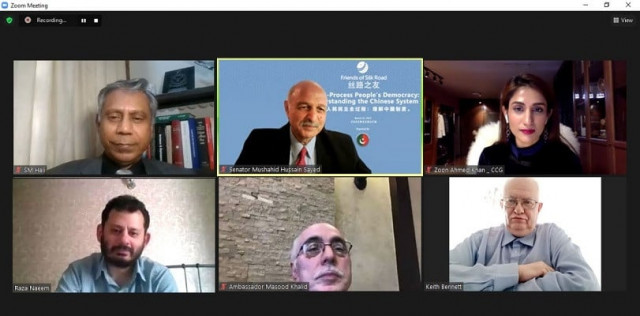China’s participation in OIC moot hailed
Mushahid says Pakistan-Saudi Arabia-China ‘strategic triangle’ has key role in new emerging order

Participants of a webinar have welcomed the participation of Chinese Foreign Minister Wang Yi in the Organisation of Islamic Cooperation (OIC) Foreign Ministers Conference in Islamabad.
The Islamabad-based think tank, Pakistan-China Institute (PCI) held a special webinar that welcomed China’s participation in the OIC conference and discussed how the Chinese system had delivered for their people, ranging from poverty alleviation to good governance.
The webinar, which was held under the banner of the “Friends of Silk Road”, with the theme of ‘Whole Process People’s Democracy: Understanding the Chinese System’, started with opening remarks by Pakistan-China Institute and Senate Defence Committee Chairman Senator Mushahid Hussain, who welcomed China’s participation in OIC as a “historic first”, where China’s entry into the Muslim world coincides with America’s exit, with US retrenchment being witnessed from Southwest Asia and the Middle East.
Senator Mushahid Hussain also welcomed the close coordination between Pakistan and Saudi Arabia, enabling the invitation to China in the OIC, which was in recognition of China’s longstanding relationship and support to the Muslim World saying that the Pakistan-Saudi Arabia close collaboration was reminiscent of the brotherly bond between Pakistan and Saudi Arabia that enabled the first successful OIC summit in Pakistan in Lahore in 1974.
In the context of changing geopolitics, Senator Mushahid Hussain said that China is emerging as a key player in the Muslim world and this role is being enhanced also due to its ties with Pakistan and Saudi Arabia. He lauded the strategic shift in Saudi Arabia’s policies, both domestic and foreign, especially liberalization and opening up in Saudi society, economy, culture, plus policies curbing religious extremism and promotion of women’s rights, as well as improvement in Saudi Arabia's relations with Iran and Turkey.
He saw the emergence of a “strategic triangle” between Pakistan, China and Saudi Arabia, which can play a pivotal role in strengthening unity, economic development and connectivity in the Muslim world. He said the strategic shift in Saudi Arabia was due to the enlightened leadership of Crown Prince Mohammad bin Salman and there were now even discussions between Saudi Arabia and China for selling oil in the Chinese currency, instead of the US dollar,.
Regarding the issue of democracy in China, he referred to two surveys which were conducted in the US, both of which indicated that the ‘Chinese government was more popular than at any time during the previous 2 decades, showing an 80 per cent-plus satisfaction level among the Chinese people of their government.
He said the reason for this high level of popular satisfaction was because of good governance and a better quality of life. He added a key ingredient of any system’s credibility is the ability to deliver on popular expectations, which China had done.
Former ambassador to China Masood Khalid said that China had developed its own model of law-based state governance, adopting global best practices, in which democracy entails prosperity and a consultative process. He said President Xi Jinping remains very popular, as the lives of the Chinese people were improving with each passing day. He urged the need for cooperation between China and the United States.
Sultan Hali, who has authored books on President Xi Jinping and the Communist Party of China, referred to the remarkable transformation of China through people-centric development that has changed the lives of millions of Chinese, particularly lifting 800 million Chinese people out of poverty in just over 3 decades. He added this ‘system suits China’.
Keith Bennet, who is the co-editor of London based ‘Friends of Socialist China’,
said the Chinese system draws on the millennia of Chinese wisdom, harmony and consensus, with an inclusive, non-adversarial democratic ethos. China has no full-time politicians as even sanitation workers and bus drivers can become members of Parliament.
Pakistani journalist and researcher Zoon Ahmad Khan, who is now Research Fellow in the Centre for China and Globalisation in Beijing, said that economic empowerment of women and their social liberation was a key ingredient of China's success story which enabled China to progress so much in such a short time.
Published in The Express Tribune, March 23rd, 2022.



















COMMENTS
Comments are moderated and generally will be posted if they are on-topic and not abusive.
For more information, please see our Comments FAQ